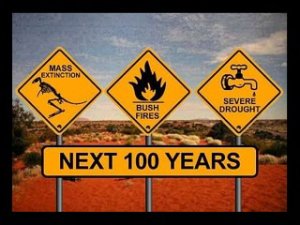The Answer, My Friend, Is Blowin’ In the Wind

Please: take a few minutes and look through the article linked above, then take a few minutes and absorb its impact.
Yes, it’s still impossible to attribute any single storm, wildfire, or heat wave to global warming. Yet all this makes one think: how many such phenomena are required until we agree that we’re experiencing what scientists have been warning us about for decades? What will be required to get the U.S. to join the global community and participate in climate change mitigation efforts?
Not that this is a new thought, but how are we going to respond to our grandchildren when they ask how it’s possible that a generation of people (you and me) knew more or less exactly what was happening to Earth’s climate and the impacts it would have on our civilization, but chose to do nothing about it?

Craig,
The danger of interpreting weather events as evidence of climate change, is obvious.
Wishful thinking is often the basis for abandoning rational objectivity in favour of deepening faith in a ‘belief’.
This eagerness to ‘believe’ leads to errors and inaccuracies. The desperate need to gain security from uncertainty, has led humans to put their faith in a long ling of ‘oracles’ of all sorts, of which scientist are just the latest version.
Every week and in nearly every discipline, scientists are constantly revising or overthrowing previously fiercely held positions. What is scientific certainty today, may not be so tomorrow. This is especially true when a a large dollop of political ideology is added to scientific conjecture.
Nor is the media exactingly accurate when reporting ‘record’ anything, including temperatures. The old adage, ‘never let the truth interfere with a good story’, is the rule, not the exception, giving rise to urban myths.
Most of the world believes, thanks to the media and commentators like David Suzuki, that coral reef bleaching is the result of ‘GW/CC’, the fact this isn’t true, and long been disproved, but hasn’t captured the media’s attention the way David Suzuki’s alarmist exclamations did, only proves most people would rather continue to believe a fashionable error, than a rational explanation.
Craig, you also persist in perpetuating unsubstantiated claims because they suit your belief system, rather than question the veracity of the information. When presented with evidence to the contrary you either dismiss, or ignore that evidence preferring to ” keep the faith”.
It’s kind of funny that you think that environmentalists are engaging in “wishing thinking” when contemplating the destruction of the planet’s capacity to support life. You have a lot to offer, but you’re a very sad person in a lot of ways.
Craig,
Not all environmentalists waste time relishing the “destruction of the planet” and other cataclysmic events. It’s true some cover themselves in sackcloth and ashes while advocating exciting and usually completely erroneous nonsense.
The rest of us just get on with small, but practical projects to improve life for all on the planet.